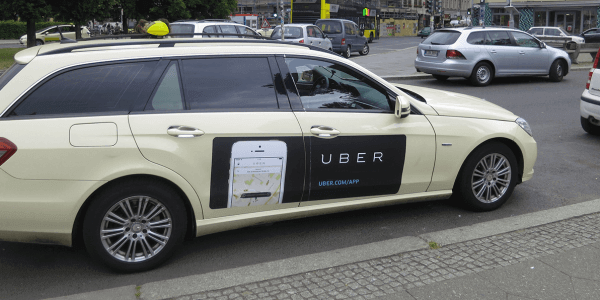The idea of driving around in your car in your free time and picking up extra cash sounds pretty good. Thanks to companies like Uber and Lyft, you may even be able to turn it into a full-time job. You choose your hours, your location, and the rides. Sounds pretty great, doesn’t it?
Driving for a company like Uber or Lyft may sound like a great (and easy) way to earn money, but what happens if you get into an accident?
WHAT ARE UBER AND LYFT?
Companies like Uber and Lyft are officially known as transportation network companies (TNCs). The customer connects to the company and you as a driver through their mobile app. You give them a ride. Both you and the TNC get paid. You’re acting as livery – a driver with a passenger for a fee.
Customers and drivers are responding to the service. Riders like the ease of use – find the closest ride, pay from your phone, and get to where you’re going – plus the ability to choose and rate drivers. With an average of 20,000 new sign-ups a month, drivers love flexibility and the promise of relatively easy money.
Although it sounds great, no system or service is perfect.
WHAT ABOUT AUTO INSURANCE?
If you think your personal auto insurance will protect you while you’re working for a TNC like Uber, think again. Your auto insurance policy probably doesn’t even apply to the type of driving you’re doing. Worse, if caught driving for pay, you could even lose your coverage.
Most auto insurance policies exclude coverage for business activities – like driving people around town for money – in your personal vehicle. Your insurer may recommend you purchase commercial auto insurance, or in some states, provide you with the option of ridesharing insurance. This is still relatively new, and 90 percent of drivers don’t have the right coverage.
TNC AUTO LIABILITY COVERAGE ISN’T PERFECT, EITHER
TNCs may offer a form of auto liability coverage while you work as one of their drivers, but coverage can change without notice and won’t cover everything. Typically, the policy only covers physical damage to your vehicle. Thanks to recent litigation against Uber, they have updated some of their coverage practices:
- There are three periods in which Uber’s coverage applies.
- Period 1 – The app is on, but you haven’t received any requests.
- Period 2 – You’ve accepted a ride and you’re heading to your passenger.
- Period 3 – The passenger is in your vehicle for the trip.
- Once the passenger leaves, the coverage goes back to period one, assuming that you leave the app on.
- There is no collision coverage during period one.
- You may owe a deductible if you’re involved in an accident.
WHAT HAPPENS IF YOU GET INTO AN AUTO ACCIDENT?
Assuming you’re in the 90 percent of drivers without ridesharing insurance, several things happen once you get into an accident – and none of them are good.
- Your auto insurance will probably deny the claim. They could cancel your policy for one of two reasons:
- Failure to disclose – most major insurers actually ask if you work for a TNC these days. Failure to tell the company never ends well.
- Usage – working for Uber or Lyft drastically changes the average usage of your vehicle and exposes you to increased risk. If you didn’t update that information, you’re not using your vehicle for it’s “typical” use.
- You could be held financially responsible for any expenses above and beyond the limits of the company’s insurance policy. This could happen even if the company’s insurance liability picks up some of the costs. This happens most often when serious injury or even death occur.
- As an independent contractor, you’re not covered under workers compensation coverage for the company. Any injuries you sustain will be at your own expense or using your own insurance.
Before you decide to work for any TNC, even Uber or Lyft, talk to your insurance agent. Find out if ridesharing insurance is an option for you. Decide if you have the resources and coverage to handle potential accidents. It sounds pretty easy to jump in the car, open an app, and start driving, but you need to consider if the potential costs are worth the money you earn and your time.
Want to know more? Contact us at Charlotte Insurance and we’ll be happy to go over your auto insurance options with you.

